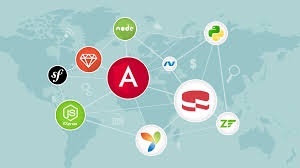Source:-analyticsindiamag.com
Web frameworks are usually used by the developers to ease the building process of web applications. They help developers to concentrate more on the task rather than the complex coding part. According to the Stack Overflow Developer Survey 2019, among nearly 90,000 developers, 63,585 developers chose the most loved web frameworks where jQuery, React.js and Angular secured the first, second and third positions respectively.
In this article, we list down the 11 most popular web frameworks that have been used by the developers in 2019.
(The frameworks are listed down in the order of their popularity)
1| jQuery
Created in 2006, jQuery is a free and open-source JavaScript library designed to simplify HTML DOM tree traversal and manipulation, as well as event handling, CSS animation, among others. This library simplifies the interaction between JavaScript and Document Object Model (DOM). The other features of this library are cross-browser support, AJAX support, CSS3 selectors and basic XPath syntax support, among others. As of May 2019, this library has been used by 72% of the 10 million most popular websites.
W3Schools
2| React
React is a declarative, efficient, and flexible JavaScript library for building user interfaces. This framework lets a developer compose complex UIs from small and isolated pieces of code called “components”. It can be used as a base in the development of a single-page as well as a mobile application.
3| Angular(previously Angular JS)
Created by the Angular Team at Google and a group of developers community, Angular is a TypeScript-based open-source web application framework. This development platform can be used for building mobile and desktop web applications using TypeScript/JavaScript and other languages. It uses a hierarchy of components as its primary architectural characteristic and has a different expression syntax for property and event bindings.
4| ASP.NET
ASP.NET is an open-source, cross-platform framework for building web applications as well as services with .NET and C#. Created by Microsoft, this framework allows developers to build dynamic web applications. It enables real-time bi-directional communication between server and client. For building web applications, ASP.NET extends the .NET platform with tools and libraries such as web-page templating syntax, known as Razor for building dynamic web pages using C#, the base framework for processing web requests, libraries for common web patterns and other such.
5| Express
Express is an open-source web application framework for Node.js. This is a minimal and flexible Node.js web application framework which provides a robust set of features for web and mobile applications. The features of this framework include allowing to dynamically render HTML Pages based on passing arguments to templates, setting up of middlewares and much more.
6| Spring
Spring is an application framework written in Java programming language. This framework provides a comprehensive programming and configuration model for modern Java-based enterprise applications – on any kind of deployment platform. It includes a number of modules to provide services such as aspect-oriented programming, convention over configuration, data access, database connectivity and much more.
7| Vue
Vue is a popular framework in JavaScript. It is an open-source progressive framework for building user interfaces and is designed in such a manner that the core library is focused on the view layer only, and is easy to pick up and integrate with other libraries or existing projects.
See Also
Opinions
Natural Language Processing vs Natural Language Understanding: What’s The Difference
8| Django
Django is a high-level Python-based open-source web development framework for backend web applications. In one of our articles, we discussed the final release of Django 3.0 which will bring a number of intuitive features. This framework is designed to satisfy the complex requirements of experienced web developers.
9| Flask
Flask is a lightweight WSGI Python web application framework. This framework became widely popular as an alternative to Django projects with the monolithic structure and dependencies. It is classified as a microframework because it does not require particular tools or libraries.
10| Laravel
Laravel is a web application framework with syntax written in PHP language. Some of the features of Laravel are a modular packaging system with a dedicated dependency manager, different ways for accessing relational databases, built-in authentication and authorisation, MVC support and Object-Oriented approach, Artisan Console, Eloquent ORM and other such.
11| Ruby on Rails
Ruby on Rails is one of the most popular frameworks written in Ruby. This is an open-source server-side web application framework which is a model–view–controller (MVC) framework that provides default structures for a database, web pages, etc. It is a framework for building websites and it combines the Ruby programming language with HTML, CSS, and JavaScript to create a web application that runs on a web server.
